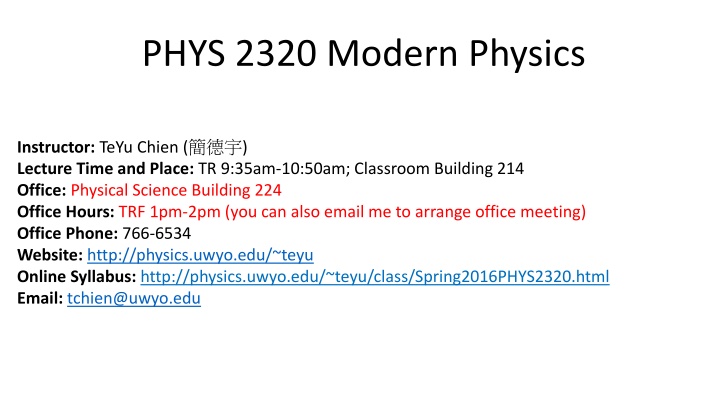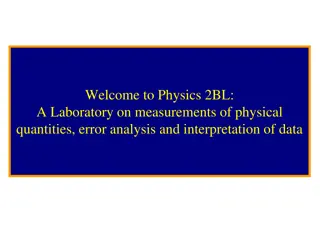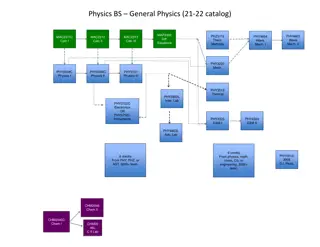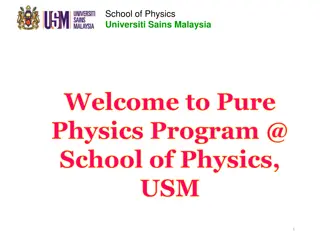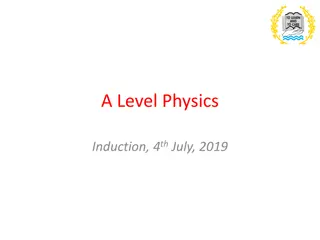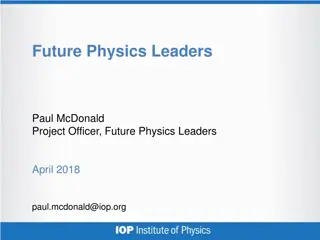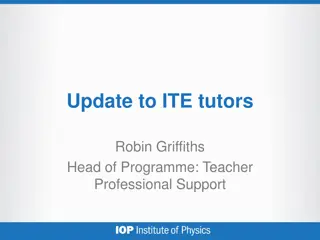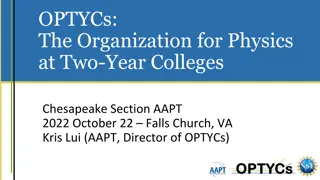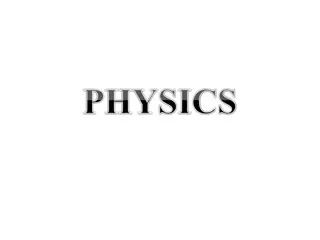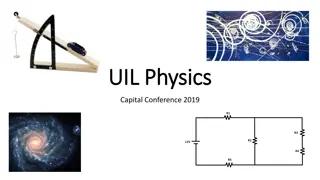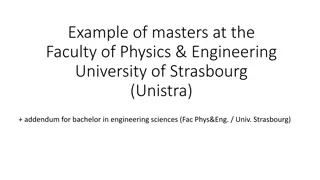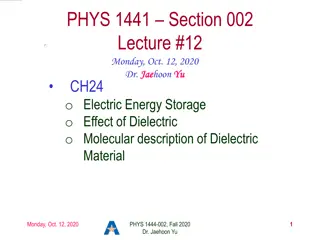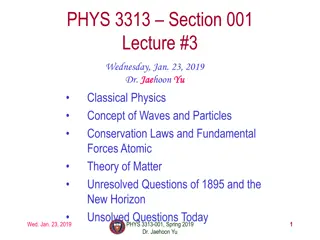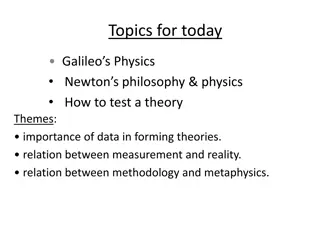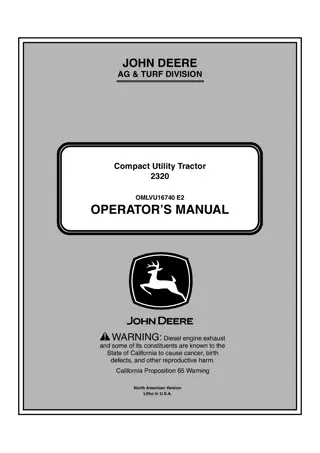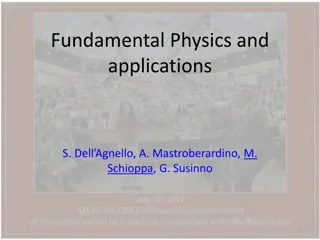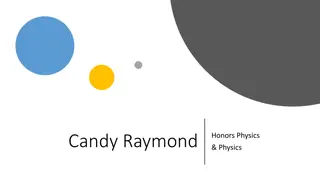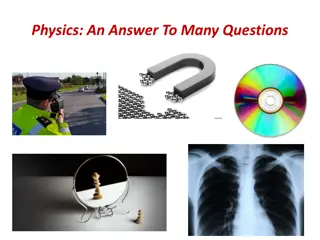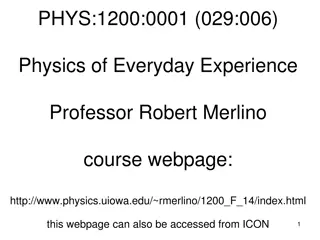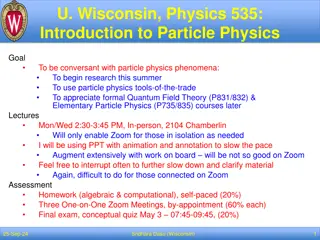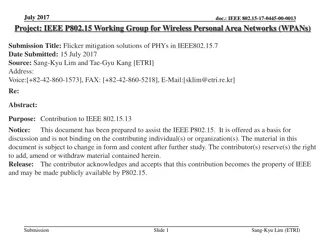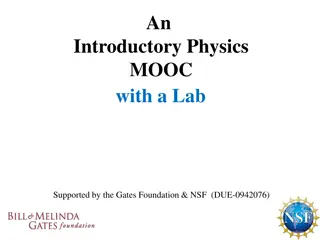Overview of PHYS 2320 Modern Physics Course
Understanding modern physics with a focus on relativity, quantum theory, atomic physics, and more. Topics covered include classical mechanics, quantum effects, and relativistic effects. Required materials, grading system, policies, and contact information for the instructor are provided.
Download Presentation

Please find below an Image/Link to download the presentation.
The content on the website is provided AS IS for your information and personal use only. It may not be sold, licensed, or shared on other websites without obtaining consent from the author.If you encounter any issues during the download, it is possible that the publisher has removed the file from their server.
You are allowed to download the files provided on this website for personal or commercial use, subject to the condition that they are used lawfully. All files are the property of their respective owners.
The content on the website is provided AS IS for your information and personal use only. It may not be sold, licensed, or shared on other websites without obtaining consent from the author.
E N D
Presentation Transcript
PHYS 2320 Modern Physics Instructor: TeYu Chien ( ) Lecture Time and Place: TR 9:35am-10:50am; Classroom Building 214 Office: Physical Science Building 224 Office Hours: TRF 1pm-2pm (you can also email me to arrange office meeting) Office Phone: 766-6534 Website: http://physics.uwyo.edu/~teyu Online Syllabus: http://physics.uwyo.edu/~teyu/class/Spring2016PHYS2320.html Email: tchien@uwyo.edu
What is Modern Physics? Among the branches of theory included in classical physics are: Classical mechanics Classical electrodynamics (Maxwell's Equations) Classical thermodynamics It is generally assumed that a consistent description of these observations will incorporate elements of quantum mechanics & relativity. in practice, quantum effects typically involve distances comparable to atoms (roughly 10 9m), while relativistic effects typically involve velocities comparable to the speed of light (roughly 108m/s)
Modern Physics Relativity Quantum Theory Something very small Something very fast German physicist Albert Einstein, founder of the theory of relativity. German physicist Max Planck, founder of quantum theory.
Topics to be covered: Topics to be covered: Relativity Quantum Physics Atomic Physics Statistical Physics Molecular Spectra Solid State Physics Nuclear Physics (optional) Particle Physics (optional) Astrophysics and Cosmology (optional)
Required Materials Text: Modern Physics, Sixth Edition, by Paul A. Tipler/Ralph A. Llewellyn Poll Everywhere for interactive in-class activities and attendance: You need to register at http://www.polleverywhere.com. See instruction below.
Grading Grading Exams: 50% (mid-term and final, 25% each) Homework: 40% Attendance: 10% Total: 100% Scale: A: (> 90%); A-: (86.66-89.99%); B+: (83.33-86.66%); B: (80- 83.33%); B-: (76.66-79.99%); C+: (73.33-76.66%); C: (70-73.33%); C-: (66.66-69.99%); D+: (63.33-66.66%); D: (60-63.33%); F: (< 60%)
Policies Partial credit: Partial credit will be given to solutions of the problems that are partially completed, have minimal algebra mistakes, wrong sign, or units. The steps in the solution must be presented, skipping steps means skipping points that you can earn, and no grade will be given to a problem showing only a solution (such as a number) without showing the intermediate steps to get there. Homework: We will have homework for each chapter whenever we finish one chapter. Students may work in groups to discuss the homework, however, be sure to write the homework alone to prevent from plagiarism. Students involved with plagiarized homework will be investigated. Homework considered as plagiarism will be graded as zero point, even you are the original copy. No homework grade will be dropped. The deadline for each homework assignment is typically in the beginning of the class one week after it is assigned. Be advised not to wait till the last minute and use the office hour frequently. It is your responsibility to hand-in your homework before the deadline. Late homework will miss 10 % of points per day, and accumulative.
Policies Bonus Homework: We will have one bonus homework, which will be hands out in the last week of the class. The due day will be on the final exam day right at the beginning of the exam. No late submission is allowed for the bonus homework. Quiz: Quiz will be a short conceptual question asked in lecture through polleverywhere, but not every lecture. The quiz will not be included in grading, but will be count for attendance. The time for the quiz will be based on the progress of the lecture. So be sure to attend the lecture to take the quiz. The quiz will be conducted through Polleverywhere, please see below about how to sign it up correctly. Attendance: Attendence will be counted with the quiz through the Polleverywhere. The attendance will be calculated based on the total number of votes made through the Polleverywhere through the semester (include both Quiz and Think About It). It is your responsibility to make sure you are in the polleverywhere system (by checking with me) and your vote is successfully inputed every time.
Policies Disability Statement:If you have a physical, learning, or psychological disability and require accommodations, please let me know as soon as possible. Contact University Disability Support Services in SEO, room 330 Knight Hall. Academic honesty: Academic dishonesty is defined in University Regulation 802, Revision 2 as an act attempted or performed which misrepresents one s involvement in an academic task in any way, or permits another student to misrepresent the latter s involvement in an academic task by assisting the misrepresentation.? And there are rules and procedures to handle such cases, and serious penalties will be imposed. Note that a student who copies and a student who let s another student copy are both covered by the university rules.
General expectations General expectations Attend and participate in each lecture and do homework on time. You are required to read each chapter before and after it is discussed in class. Live up to your responsibility to understand the material presented. If you have difficulty of understanding it, please get good use of office hours. Take notes during lectures as appropriate. Complete reading assignments and homework. Be ready for exams. Work in compliance with the university code of academic honesty. Ask questions. There are no stupid questions. Have fun.
Exams: Exams: Homework will contain mostly quantitative problems, whereas lectures will deal with largely conceptual, multiple-choice questions. Hence, the exams will contain both quantitative and conceptual problems. The exams will be closed book and closed notes. I will provide a "cheat sheet" with useful formulas and constants. No make- up exams will be given. All exams are mandatory and no grade will be dropped or replaced. There will be two exams: mid-term and final. Time and Place Covered Chapters Mid-term 3/10/2016 (Thursday), Place: TBA, 5:00 pm - 7:00 pm Chapters 1-5 Final 5/10/2016 (Tuesday), CR 214, 10:15 am - 12:15 pm Chapters 6-10
Polleverywhere Go to http://www.polleverywhere.com Create an account. I need to be able to determine who you are, so use your uwyo email address to register, and your FULL name De-select "I am an educator" Select "United States" (not "United States - Education") Once your account has been created, register your cell phone number (ignore this if you will use a laptop). Go under "Settings" to add the number (with your area code). Follow instructions to certify your cell number. Please allow me to see your name: Under "Settings" choose "Voter Registration". Select "Register as a voter". On the next page you should enter my email ("tchien@uwyo.edu"). Go to http://www.polleverywhere.com/teyu Bring your cell phone or laptop to each class. Standard text messaging rates may apply.
